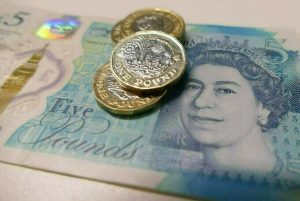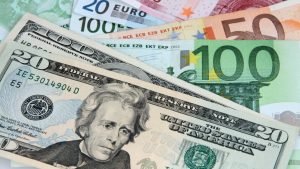US DOLLAR RECOVERS, AUSSIE HITS FIVE-YEAR LOW AFTER CHINA TARIFF RETALIATION
The U.S. dollar rebounded against major currencies such as the euro and yen on Friday after Federal Reserve Chairman Jerome Powell acknowledged the repercussions of larger-than-expected U.S. tariffs and signaled a cautious tone on future easing. Powell said tariffs increased the risk of higher inflation and slower growth, highlighting the difficult path ahead for policymakers at the U.S. central bank. The Australian dollar, meanwhile, seen as a liquid proxy for the yuan, hit five-year lows against the greenback after China announced additional tariffs on U.S. goods on Friday. “This is a bit of a more hawkish reaction that he’s focusing on the inflationary impact of tariffs. The U.S. economy has been dealing with higher inflation, and because the U.S. is the one doing the tariffs and it will apply to all imports, it’s likely to have more impact on the U.S.,” said Peter Vassallo, FX portfolio manager at BNP Paribas Asset Management. Powell’s comments followed data earlier in the day showing that nonfarm payrolls rose by 228,000 jobs last month after a downwardly revised 117,000 rise in February, well above the 135,000 forecast. The unemployment rate ticked up to 4.2% from 4.1%.

STERLING DROPS SHARPLY AS SELLOFF IN RISKY ASSETS DEEPENS
Sterling fell against the dollar and the yen, while hitting a seven-month low versus the euro on Friday as China’s additional tariffs against the U.S. deepened a selloff in risky assets. Global stocks have tumbled for a second day after U.S. President Donald Trump’s sweeping tariff plans, with the selloff deepening after China said it would impose additional tariffs of 34% on all U.S. goods. Among major developed market currencies (G10), sterling tends to be more volatile and sensitive to risk sentiment than traditional safe havens such as the Japanese yen, the Swiss franc, or the U.S. dollar. However, Trump’s moves have raised questions about the safe-haven status of the greenback. The pound fell 0.6% to $1.3014. It dropped 1.6% against the yen to a fresh five-week low at 187.92. Market participants are looking to the possibility of a trade deal between Britain and the United States. British Prime Minister Keir Stammer said earlier this week that talks with the U.S. on such a deal that would help Britain avoid being hit by Trump’s import tariffs were “well advanced “However, investors boosted their bets on future Bank of England rate cuts and are now fully pricing in three 25 basis points in easing moves by year-end, in line with similar market expectations for the European Central Bank.
CANADIAN DOLLAR PARES WEEKLY GAIN AS JOBS DATA LIFTS RATE CUT BETS
The Canadian dollar weakened against its U.S. counterpart on Friday, giving back some of its weekly gain, as oil prices tumbled and domestic data showed the global trade war beginning to hurt the labour market. The loonie was trading 0.7% lower at 1.4195 per U.S. dollar, or 70.45 U.S. cents, after trading in a range of 1.4054 to 1.4242. It touched on Thursday its strongest intraday level since December 6 at 1.4025 as Canada avoided fresh tariffs on its goods. For the week, the loonie was up 0.9%. Canadian employment fell by 33,000 in March, the first decrease in more than three years, and the unemployment rate edged up to 6.7% as the uncertainty around trade tariffs took a toll on hiring. “It does feel like that we should see the labour sector come under a bit more strain in the coming months and that might require a bit more action from the Bank of Canada than the market was expecting,” said Bipan Rai, head of ETF and structured solutions strategy at BMO Global Asset Management. Investors see a 65% chance the Bank of Canada would continue its interest rate cutting campaign at a policy decision on April 16, up from 50% before the data. The price of oil, one of Canada’s major exports, tumbled 7.5% to $61.93 a barrel, adding to its steep decline the day before, as China hit back in an escalating global trade war with the United States.

EURO GAINS ALONGSIDE SAFE-HAVENS AS TRUMP TARIFF FALLOUT GRIPS MARKETS
Investors bought the euro and poured into safe havens such as the yen and Swiss franc on Monday as the market rout from U.S. President Donald Trump’s sweeping tariffs deepened and fears of a global recession grew. Global markets were sent into a tailspin on Monday as Asian stocks and Wall Street futures plunged and investors wagered that the mounting risk of a deep economic downturn could lead to a cut in U.S. interest rates as early as May. The risk-sensitive Australian and New Zealand dollars, as well as the Swedish and Norwegian crowns, all tumbled against the dollar. But the dollar in turn fell against safe haven currencies, down 0.75% against the yen to 145.790, after tumbling more than 1.4% earlier in the session, as it extended its 2% slide against the Japanese currency from last week. “The big theme has been selling USD/JPY because it’s a good U.S. recession proxy and it’s a good U.S. yields proxy and U.S. yields tanked,” said Brent Donnelly, president of market maker and analytics firm Spectra Markets.

DEMAND FOR DOLLARS FROM NON-U.S INVESTORS SURGES AS STOCKS CRUMBLE
Money markets on Monday began showing signs of strain following an aggressive selloff engulfing global equities, sending various measures of demand for dollars to their strongest in months. Three-month cross-currency basis swaps, a derivative that reflects non-U.S. demand for dollars, shot to their strongest level for the euro and the pound since late 2023, while those for the Japanese yen reached their strongest in five months. The rate of the three-month euro cross-currency basis swap hit -5.375%, its lowest since November 2023. A more negative number indicates demand for dollars from euro-based investors. A week ago, the swap rate was at 12.5% U.S. President Donald Trump at the weekend showed no signs of backing down from the widespread tariffs he announced last week that have sent shockwaves across world markets. China has already retaliated with extra tariffs investors now fear a global recession. “Keep a close watch of the EUR/USD (euro/dollar) three-month cross-currency basis swap,” ING strategists said in a note.
- CAPITALDIGEST MARKET REVIEW, 09/02/2026February 9, 2026
- CAPITALDIGEST DAILYNEWS, 09/02/2026February 9, 2026
- CAPITALDIGEST MARKET REVIEW, 02/02/2026February 2, 2026
Enter your email address for receiving valuable newsletters.
- CAPITALDIGEST MARKET REVIEW, 09/02/2026U.S. DOLLAR REBOUND TO BE CUT SHORT BY RATE CUT BETS, DOUBTS OVER FED INDEPENDENCE:...February 9, 2026
- CAPITALDIGEST DAILYNEWS, 09/02/2026TAXES, FUEL HIKE SLOW BUSINESS GROWTH IN JANUARY – NESG REPORT The report showed that...February 9, 2026
- CAPITALDIGEST MARKET REVIEW, 02/02/2026DOLLAR WEAKENS ACROSS THE BOARD AS YEN CLIMBS ON INTERVENTION RISK The dollar moved sharply...February 2, 2026












